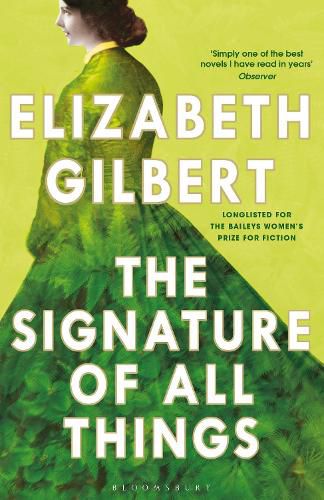Readings Newsletter
Become a Readings Member to make your shopping experience even easier.
Sign in or sign up for free!
You’re not far away from qualifying for FREE standard shipping within Australia
You’ve qualified for FREE standard shipping within Australia
The cart is loading…






From the moment Alma Whittaker steps into the world, everything about life intrigues her. Instilled with an unquenchable sense of wonder by her father, a botanical explorer and the richest man in the New World, Alma is raised in a house of luxury and curiosity. It is not long before she becomes a gifted botanist in her own right. But as she flourishes and her research takes her deeper into the mysteries of evolution, the man she comes to love draws her in the opposite direction – into the realm of the spiritual, the divine and the magical.
The Signature of All Things soars across the globe of the nineteenth century, from London and Peru, to Philadelphia, Tahiti and beyond. Peopled with extraordinary characters along the way, most of all it has an unforgettable heroine in Alma Whittaker.
$9.00 standard shipping within Australia
FREE standard shipping within Australia for orders over $100.00
Express & International shipping calculated at checkout
From the moment Alma Whittaker steps into the world, everything about life intrigues her. Instilled with an unquenchable sense of wonder by her father, a botanical explorer and the richest man in the New World, Alma is raised in a house of luxury and curiosity. It is not long before she becomes a gifted botanist in her own right. But as she flourishes and her research takes her deeper into the mysteries of evolution, the man she comes to love draws her in the opposite direction – into the realm of the spiritual, the divine and the magical.
The Signature of All Things soars across the globe of the nineteenth century, from London and Peru, to Philadelphia, Tahiti and beyond. Peopled with extraordinary characters along the way, most of all it has an unforgettable heroine in Alma Whittaker.
The Signature of All Things is a sprawling story of botany, nineteenth-century scientific development, herbariums, sea voyages, love, death, old books and abolitionists. The protagonist is Alma Whittaker, born in 1800 and daughter of the world’s richest botanical importer; she’s a child genius who dedicates her life to plants. We grow up with Alma, experience her childhood, education, sexual awakening, first love, sailing trips, suffering and joy.
The book is a type of coming-of-age story, but the bulk of the narrative takes place while Alma is in her fifties. Elizabeth Gilbert foregrounds the interests, passions and heartbreak of a woman in her middle-age, unlike so many stories which position certain events, like a characters’ first love and the negotiation of sex, as achievements to be completed early in life. The story is therefore refreshing and feels highly particular – almost like a biography.
The Signature of All Things is meticulously researched, which adds to the sense of reality. Real-life characters like Captain Cook and Joseph Banks populate the text, and the story is loaded with detail of plant life and botany, evolutionary theories, ancient texts, languages and printing processes.
I enjoyed the proliferation of different types of male and female characters; men and women alike are portrayed as crazy, brilliant, generous, thrifty, ugly, beautiful, spiritual and practical. Almost all the characters are white, but Gilbert is highly sensitive to the issues of racial slavery at the time, carefully describing the shame of the white community’s attitudes and the lack of action.
Gilbert’s writing style is highly descriptive, and it sometimes felt as though she was simply listing events in the characters’ lives to demonstrate the passage of time. I soon realised that these moments reflected the botanical taxonomies that Alma so carefully builds and cherishes, and so actually mirrored Alma’s thought processes and desires. This is a well-written and intriguing book, full of warmth, wit, historical research and, at the centre, an endearing main character.
Julia Tulloh is a freelance reviewer.
See what the Readings’ team have to say on the blog, discover related events and podcast episodes.
Travel to Ancient Greece to Renaissance Italy to the trenches of war, with these incredible historical reads.